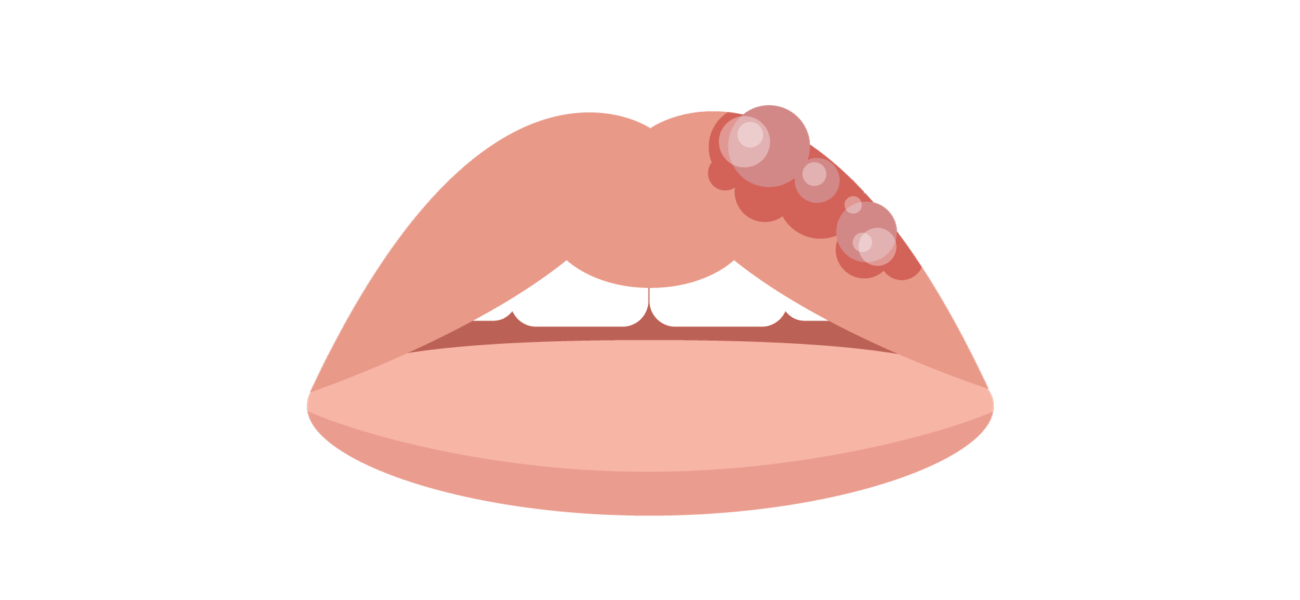Swelling of lips is a condition that involves the enlargement or protrusion of the lips due to fluid accumulation or inflammation in the skin tissue. It can affect one or both lips, and it can occur suddenly or gradually. Swelling of lips can have various causes, such as allergies, infections, injuries, or diseases. It can also cause pain, redness, itching, burning, or other symptoms. Swelling of lips can usually be treated at home with simple remedies, but sometimes it may require medical attention.
Causes of Swelling of Lips
Swelling of lips can have many different causes, depending on the type and location of the swelling. Some of the possible causes are:
• Allergy. An allergic reaction is one of the most common causes of swelling of lips. It occurs when the immune system overreacts to a substance that it considers harmful, such as food, medication, insect venom, or environmental allergens. The substance triggers the release of histamine, a chemical that causes inflammation and swelling in the body. Swelling of lips due to an allergy can appear within minutes or hours of exposure to the allergen and can be accompanied by other symptoms such as hives, itching, wheezing, or anaphylaxis (a severe and life-threatening reaction that involves difficulty breathing, low blood pressure, and shock)
• Infection. An infection is another common cause of swelling of lips. It occurs when bacteria, viruses, fungi, or parasites invade the skin and cause inflammation and pus formation. Some examples of infections that can cause swelling of lips are impetigo (a bacterial infection that causes honey-colored crusts on the skin), herpes simplex virus (HSV) (a viral infection that causes cold sores or blisters on or around the lips), candidiasis (thrush) (a fungal infection that causes white patches or spots on the tongue, cheeks, roof of the mouth, or throat), and angioedema (a condition that causes swelling under the skin surface due to an allergic reaction or a genetic disorder).
• Injury. An injury is another common cause of swelling of lips. It occurs when trauma to the mouth from biting, burning, braces, dentures, dental work, or sports accidents causes damage to the skin tissue and blood vessels. Swelling of lips due to an injury can appear immediately or within a few days of the trauma and can be accompanied by pain, bleeding, bruising, or infection.
• Disease. A disease is a less common but more serious cause of swelling of lips. It occurs when an underlying condition affects the mouth and causes inflammation or abnormal growth in the tissue. Some examples of diseases that can cause swelling of lips are autoimmune diseases (such as lupus or pemphigus), inflammatory diseases (such as Crohn’s disease or ulcerative colitis), metabolic diseases (such as diabetes or iron deficiency anemia), and cancer (such as leukemia or lymphoma).
Symptoms of Swelling of Lips
Swelling of lips can have various symptoms, depending on the cause and severity of the condition. Some common symptoms that may accompany swelling of lips are:
• Pain. The swollen lip may feel sore, tender, or throbbing due to inflammation, infection, or injury. Pain can make it difficult to eat, drink, talk, or brush your teeth.
• Itching. The swollen lip may feel itchy due to irritation, allergy, or infection. Itching can worsen the swelling by causing more damage to the skin.
• Burning. The swollen lip may feel burning due to injury, infection, or allergy. Burning can also be caused by spicy or acidic foods.
• Redness. The swollen lip may appear red or warm due to increased blood flow or infection. Redness can indicate inflammation, irritation, or allergy.
• Bleeding. The swollen lip may bleed due to injury, infection, or disease. Bleeding can also be caused by brushing or flossing too hard. Diagnosis of Swelling of Lips To diagnose the cause of swelling of lips, a doctor will usually perform a physical examination and ask about the history and symptoms of the condition. The doctor may also order some tests to confirm the diagnosis or rule out other possible causes. Some of these tests are:
• Swab test. This involves taking a sample of fluid or tissue from the swollen lip using a cotton swab and sending it to a laboratory for further testing. This can help identify the type and cause of infection, such as bacteria, virus, fungus, or parasite.
• Allergy test. This involves exposing the skin to small amounts of different substances that may trigger an allergic reaction and observing the response. This can help identify the specific allergens that cause swelling of lips and guide the treatment and prevention strategies.
• Blood test. This involves drawing a sample of blood from a vein and measuring the levels of certain substances in the blood that may indicate inflammation, infection, autoimmunity, or metabolic disorders. Examples of blood tests include complete blood count (CBC), erythrocyte sedimentation rate (ESR), C-reactive protein (CRP), rheumatoid factor (RF), antinuclear antibody (ANA), and glucose.
Treatment of Swelling of Lips
The treatment of swelling of lips depends on its cause, severity, and impact on daily life. The main goals of treatment are to relieve symptoms, reduce inflammation, clear infection, and prevent complications. Some common treatments for swelling of lips are:
• Medications. These can help reduce pain and inflammation in the lips. They can be taken orally, applied topically, or injected into the lip. Examples of medications include nonsteroidal anti-inflammatory drugs (NSAIDs) such as ibuprofen (Advil) or naproxen (Aleve), acetaminophen (Tylenol), corticosteroids such as hydrocortisone cream or prednisone pills, antibiotics for bacterial infections, antivirals for viral infections, antifungals for fungal infections, antiparasitics for parasitic infections, immunosuppressants for autoimmune diseases, and biologics for cancer.
• Cold compress. This involves applying a cold pack or ice wrapped in a towel to the swollen lip for 15 to 20 minutes several times a day. This can help numb the pain and reduce swelling. Do not apply ice directly to the skin or for longer than 20 minutes at a time, as this can cause frostbite or nerve damage.
• Oral hygiene. This involves brushing and flossing the teeth regularly and gently to prevent plaque buildup and infection. It also involves avoiding tobacco, alcohol, spicy foods, acidic foods, and other irritants that can worsen swelling of lips.
• Surgery. This involves removing or destroying the affected tissue with a scalpel, laser, or liquid nitrogen. It can be used for conditions such as warts, moles, or cancer. Home Remedies for Swelling of Lips In addition to medical treatment, there are some home remedies that can help ease swelling of lips and improve comfort.
Some of these are:
• Honey. Applying raw honey to the swollen lip can help prevent infection and speed up healing. Honey has antibacterial, anti-inflammatory, and antioxidant properties that can benefit the lips.
• Aloe vera gel. Applying pure aloe vera gel extracted from the plant’s leaves to the swollen lip can help heal and hydrate the lips. Aloe vera has anti-inflammatory, antibacterial, and wound-healing properties that can help with various lip conditions.
• Tea bags. Applying wet black or green tea bags to the swollen lip can help reduce pain and inflammation. Tea contains tannins, which are natural astringents that can shrink tissues and relieve bleeding.
• Yogurt. Eating plain yogurt with live cultures can help balance the bacteria in the mouth and prevent thrush. Yogurt also contains probiotics, which are beneficial microorganisms that can boost the immune system and fight infections.
When to See a Doctor
Swelling of lips is usually not a medical emergency, but it can be a sign of a serious condition that requires prompt diagnosis and treatment. Some situations when it is advisable to see a doctor for swelling of lips are:
• The swelling is severe, sudden, or unexplained.
• The swelling is accompanied by fever, chills, rash, weight loss, or other signs of infection or systemic illness.
• The swelling is caused by an injury that results in bleeding, infection, or scarring.
• The swelling persists for more than two weeks despite home remedies and OTC medications.
• The swelling interferes with daily activities and quality of life.
Summary
Swelling of lips is a condition that involves the enlargement or protrusion of the lips due to fluid accumulation or inflammation in the skin tissue. It can affect one or both lips, and it can occur suddenly or gradually. Swelling of lips can have various causes, such as allergies, infections, injuries, or diseases. It can also cause pain, redness, itching, burning, or other symptoms. Swelling of lips can usually be treated at home with simple remedies, but sometimes it may require medical attention. In this blog post, we explored some of the possible causes, symptoms, and treatments for swelling of lips.



